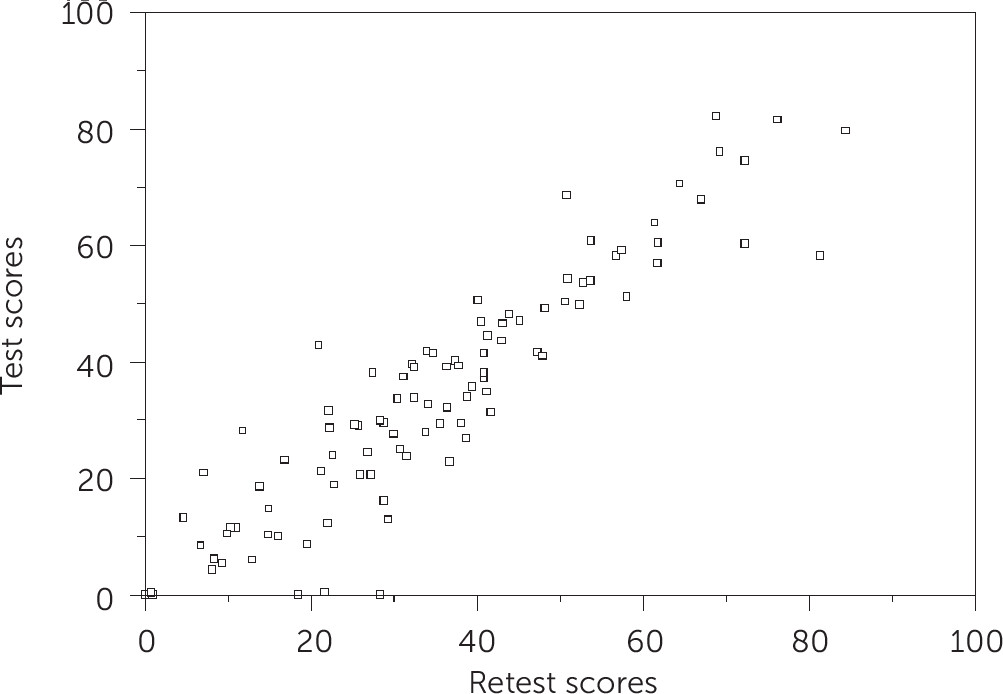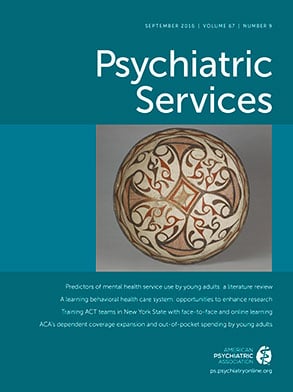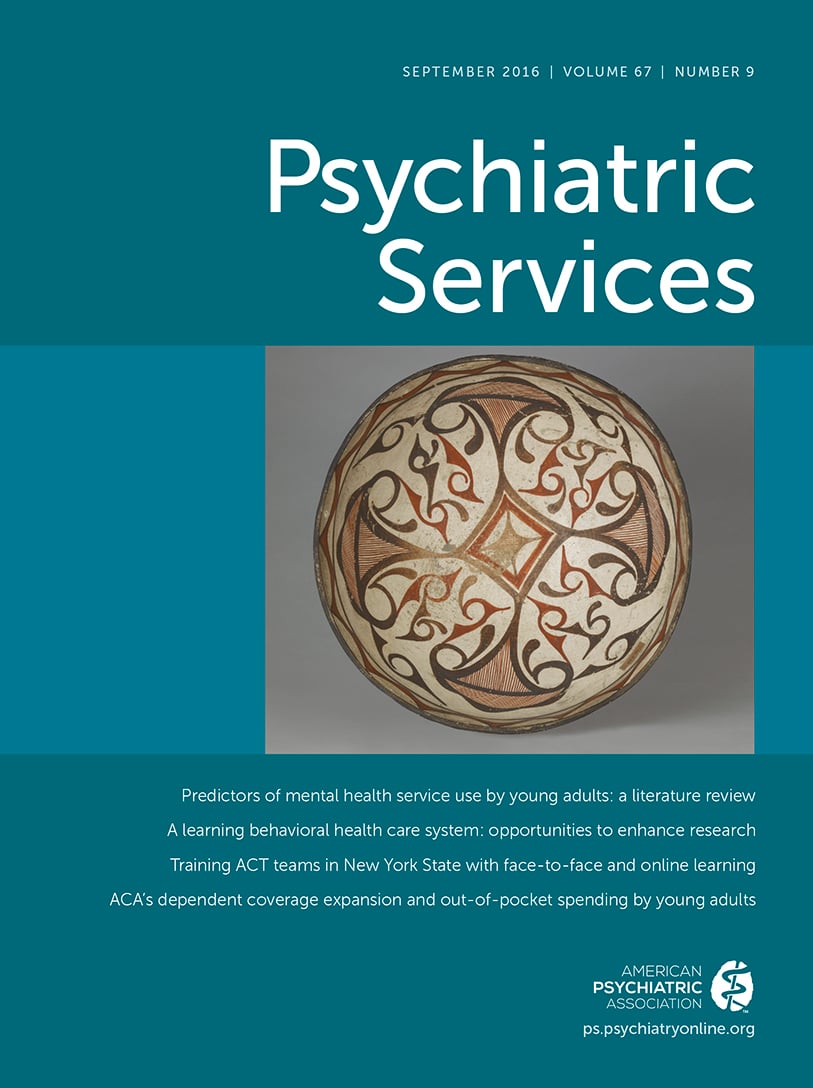Depression is associated with increased mortality, adverse health outcomes, and increased overall treatment-related costs (
1,
2). The emergency department (ED) is an important safety net for patients with behavioral health problems (
3) and thus may be an ideal setting to diagnose and initiate treatment for patients with depression. Current estimates suggest that between 8% and 32% of ED patients present with depression (
4–
6). However, conducting the detailed assessments of depression severity required to initiate treatment is often infeasible in the ED because of high patient volumes and limited access to behavioral health expertise. Therefore, any strategy that reduces the burden of empirically based assessment of depression has the potential to improve outcomes (
7).
Challenges related to depression screening and diagnosis in the ED may be overcome by the considerable progress made recently in the development of computerized adaptive testing (CAT) based in multidimensional item response theory (IRT), a method for the rapid screening and measurement of depression (
8–
12). The advantages of IRT-based CAT include the use of large item banks (≥1,000 items) that tap every domain, subdomain, and facet of an underlying disorder. From this bank, a small, optimal set of items is adaptively administered for a given patient depending on his or her severity level. Other advantages include a constant level of precision for all patients on all measurement occasions, despite changes in severity level; adaptation across testing sessions, such that the previous depression severity score is used to initiate the next testing session; elimination of response-set bias, in which patients are repeatedly asked the same questions; the use of models for both diagnostic screening and dimensional severity that are based on different statistical approaches; incorporation of the multidimensionality of mental health constructs; and the ability to combine items with different response formats, different severity levels, and different ability to discriminate high and low levels of the construct of interest in the same test. IRT-based CAT represents a paradigm shift away from traditional measurement, which fixes the number of items administered and allows measurement uncertainty (imprecision in the test score) to vary. Instead, CAT fixes measurement uncertainty and allows the content and number of items to vary.
Although CAT promises several practical advantages for depression screening and measurement, concerns about its test-retest reliability (stability) have been raised in the literature (
13). Test-retest reliability reflects the variation in measurements for a given person under the same conditions in a short period of time. Because the same test is administered twice, differences between scores should be due solely to measurement error. Determining test-retest reliability is often problematic for psychological testing, given that the construct being measured may change between the two test administrations (
14). Repeated administration of classical fixed-length tests within a short time interval is problematic because respondents may repeat answers that they recall giving earlier, leading to inflated test-retest reliability. This outcome is not a concern for CAT administration because different items are administered upon repeat administration even if the underlying trait of interest has not changed. However, it has been suggested that the use of different items upon repeat administration may lead to diminished stability relative to traditional fixed-length tests.
This study evaluated the test-retest reliability of the CAT–Depression Inventory (
9) (CAT-DI) in the dynamic environment of an academic ED.
Methods
From May 2015 to July 2015, patients (N=101) presenting to the University of Chicago Medical Center ED were screened twice within the course of their ED visit with the CAT-DI. The patients were part of a larger sample (N=1,000). Research assistants randomly selected patients to approach on the basis of a snapshot of the current ED census. Patients who had a critical illness, were age 17 or younger, were non–English speaking, were without decisional capacity, or had a behavioral health–related chief complaint were excluded. After written consent was obtained, the CAT-DI was administered twice by research assistants using tablet computers. The second test was administered within one to three minutes following the end of the first test. All procedures were approved by the University of Chicago Institutional Review Board.
The CAT-DI test is designed to ask different questions on repeated administrations on the basis of changes in severity. It also selects the next two optimal items at each point in the adaptive testing session and randomly selects between them with a .5 probability. In this way, even if the depressive severity level is unchanged, different items are presented during the two testing sessions. Scores are expressed on a 100-point scale with precision equal to 5 points. Results were determined on the basis of categories developed in our original study, with scores of 50–64 indicating mild depression; 65–74, moderate depression; and 75–100, severe depression (
9). Pearson product-moment correlation was used to assess test-retest reliability and a paired t test was used to examine bias.
Results
Test-retest reliability was assessed (r=.92). Mean±SD scores for the two testing sessions were 34.60±19.28 (range 0.0–84.4) and 33.81±20.77 (range 0.0–82.1), respectively, with an average difference in overall test score of .83. The paired t test indicated no significant bias between test sessions.
Figure 1 shows consistent results between the two testing sessions. Median time to test completion was 93 seconds (interquartile range 67–128 seconds) across the total sample. The sample included 80 (79%) patients in the normal range, 14 (14%) with mild depression, four (4%) with moderate depression, and three (3%) with severe depression.
Discussion and Conclusions
CAT based in multidimensional IRT led to reliable screening results upon repeated testing. Scores were highly correlated between the two occasions, and there was no evidence of bias. Concerns regarding limitations in test-retest reliability due to administration of different items were not supported by our findings. Test-retest reliability for CAT-DI, in fact, exceeded test-retest reliability reported in the literature for the fixed-length PHQ-9 (r=.84) (
15). The ED is an ideal setting to test the reliability of CAT because of the dynamic nature of acute conditions, which can lead to greater fluctuations in mood.
Items that provide good discrimination of high and low levels of depression in a psychiatric setting may fail to do so in a general medical ED. In future work we will examine differential item functioning between these two settings and identify specific items—for example, somatic items—that may be less useful for the assessment of depression in the ED. These items can be eliminated from the adaptive administration process in the ED, leading to further increases in precision and decreases in test length in this setting.
Acknowledgments
The authors acknowledge the efforts of Dave Patterson, B.S., and of Alexandra Berthiaume, Cody Davis, Annie Hao, and Anna Shin, B.A., who served as volunteer research assistants in the conduct of this study.


